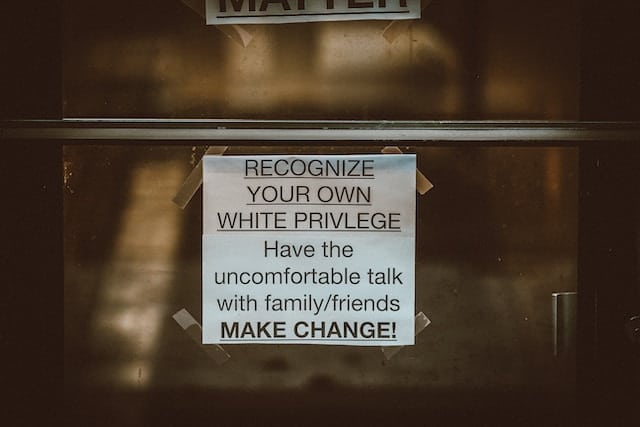
We as a society are increasingly aware of the effects of privilege and oppression on all aspects of our lives, including our mental health. As a result, this is a topic that may come up in therapy. You may even choose to go to therapy specifically for this reason. There are many ways that this can show up in the therapy room. A competent therapist will support you through the process.
Browse our Therapist Directory
Defining the Effects of Privilege and Oppression
Similar to discussing anti-racism and the impacts of white supremacy, discussing the effects of privilege and oppression as it relates to therapy depends upon the person who is coming to therapy for this reason. Therefore, it’s important to understand the differences between privilege and oppression as well as the relationship between them.
Privilege vs. Oppression
Privilege refers to the unearned advantages and benefits that individuals or groups may have in society based on their social identities, such as race, gender, sexual orientation, socioeconomic status, ability, and more. Privilege can be both visible and invisible, and it can influence opportunities, access to resources, and overall life outcomes.
Oppression, on the other hand, refers to the systemic and institutional discrimination and disadvantage that individuals or groups may face due to their social identities. Oppression can manifest in various forms, including racism, sexism, homophobia, ableism, and others. It leads to unequal power dynamics, limited opportunities, and disadvantages for those who experience it.
Privilege vs. Oppression in Therapy
Privilege:
- Therapeutic Focus: In therapy, the concept of privilege often involves exploring how a client’s privileged identities may have influenced their life experiences, opportunities, and self-perception. For example, a person who benefits from racial privilege may have had more access to resources, education, and opportunities, which can affect their worldview and self-confidence.
- Responsibility: Clients who possess privileged identities may need to grapple with feelings of guilt, responsibility, or a sense of obligation to understand and address how their privilege impacts others and their interactions with the world.
- Insight and Empathy: Understanding one’s own privilege can lead to increased empathy and awareness of the struggles faced by individuals who lack the same advantages. This self-awareness can facilitate more meaningful and respectful relationships with others who experience different societal barriers.
Oppression:
- Therapeutic Focus: In therapy, the concept of oppression centers around exploring how societal discrimination and marginalization may have affected a client’s mental health, self-esteem, and emotional well-being. Clients who have experienced oppression may carry trauma, anxiety, or depression as a result of the discrimination they have faced.
- Empowerment and Validation: In therapy, it is essential to validate the client’s experiences of oppression and to empower them to reclaim their agency and voice. Therapists can provide a safe space for clients to process their emotions and develop coping strategies to navigate the impact of oppression on their lives.
- Addressing Internalized Oppression: Some clients who have experienced oppression may internalize negative societal messages, leading to feelings of self-hate, worthlessness, or a sense of powerlessness. Therapy can help individuals challenge and counteract these harmful beliefs.
- Advocacy and Social Change: Therapy can also empower clients to engage in advocacy and social change efforts, challenging oppressive systems and promoting greater inclusivity and equity in society.
While there is, of course, more to it than this, this is a starting point for understanding how issues of privilege and oppression may show up in therapy.
Effects of Privilege and Oppression In Therapy
Issues of privilege and oppression can arise within the context of therapy. This has the potential to offer a healthy place to address the ways in which these issues arise in other settings. Here are some key points to consider:
- Client Vulnerability and Emotional Expression: For individuals who have experienced oppression, therapy can provide a safe and supportive space to express and process the emotions associated with their experiences. Clients may share feelings of anger, frustration, sadness, or anxiety stemming from their encounters with discrimination and marginalization.
- Trust and Therapeutic Alliance: Addressing privilege and oppression requires a strong and trusting therapeutic alliance between the client and therapist. The therapist’s cultural competence and ability to understand and empathize with the client’s unique experiences play a crucial role in fostering this alliance.
- Cultural Sensitivity and Competence: Therapists must be culturally sensitive and competent to navigate conversations about privilege and oppression effectively. This includes being aware of their own biases and privilege, as well as understanding the broader systemic issues that affect the client’s life.
- Self-Exploration and Identity Development: Clients may grapple with questions about their identity and how their various social identities intersect. Therapy can be a space for clients to explore and develop a stronger sense of self in the face of societal messages and expectations.
- Validation and Empowerment: Validation is a critical aspect of therapy when discussing the effects of oppression. Clients need to feel their experiences are acknowledged and respected. Additionally, therapy can empower clients to challenge oppressive narratives and develop a sense of agency in navigating their lives.
- Trauma and Healing: Individuals who have experienced oppression may carry trauma resulting from their experiences. Therapy can help clients process and heal from these traumas, enabling them to move forward and build resilience.
- Coping Strategies and Resilience: Clients may have developed various coping mechanisms to navigate the effects of privilege and oppression. Some coping strategies may be adaptive, while others might be maladaptive. Therapy can assist in identifying and modifying these strategies as needed.
- Social Support and Community Building: Therapy can be an opportunity for clients to discuss their support networks and build connections with communities that understand and validate their experiences.
- Advocacy and Empowerment: Clients may find a sense of empowerment in therapy, leading them to engage in advocacy efforts to challenge oppressive systems and promote social change.
- Intersectionality: Recognizing and understanding the intersectionality of privilege and oppression is essential in therapy. The therapist and client must acknowledge that various social identities may simultaneously impact the client’s experiences and well-being.
More on Intersectionality
Intersectionality was coined by Kimberlé Crenshaw, a legal scholar and critical race theorist, in the late 1980s. The term originally emerged in the context of analyzing how multiple forms of oppression (such as racism, sexism, and classism) intersect and overlap, creating unique experiences for individuals who belong to multiple marginalized groups.
The core idea of intersectionality is that individuals hold multiple social identities (e.g., race, gender, sexual orientation, disability, religion, etc.), and these identities do not exist independently of each other. Instead, they intersect and interact in complex ways, shaping a person’s experiences and opportunities.
For instance, a woman of color may experience discrimination differently from a white woman or a man of color due to the interplay of race and gender. Similarly, a disabled person who belongs to the LGBTQ+ community may face unique challenges not experienced by someone with only one of those identities.
However, intersectionality goes beyond analyzing the intersections of oppression; it also acknowledges that individuals may hold privileged identities alongside marginalized ones. For example, a cisgender woman may experience gender-based discrimination but also hold privileges due to her racial or socioeconomic background.
The concept of intersectionality encourages a more nuanced understanding of social experiences and emphasizes the importance of recognizing both privilege and oppression in various social contexts. By acknowledging intersectionality, we can better grasp the complexities of individuals’ experiences and work towards more inclusive and equitable approaches to addressing social issues.
Finding a Therapist for Working Through Issues of Privilege and Oppression
Choosing a therapist to discuss issues of privilege and oppression requires careful consideration to ensure that you find a professional who is culturally competent, sensitive, and well-equipped to address these complex topics. Here are some essential factors to look for when selecting a therapist for such discussions:
- Cultural Competence and Awareness: The therapist should demonstrate a deep understanding of privilege, oppression, and the impact of social identities on individuals’ experiences. They should be familiar with concepts like intersectionality and be well-versed in addressing issues related to race, ethnicity, gender, sexual orientation, disability, and other marginalized identities.
- Training and Expertise: Look for therapists who have specific training or experience in working with clients from diverse backgrounds and who have expertise in addressing issues related to privilege and oppression. Credentials in multicultural counseling or diversity training can be indicators of their knowledge in this area.
- Openness and Non-Judgmental Attitude: A good therapist should create a safe and non-judgmental environment where you can openly discuss your experiences with privilege and oppression without fear of criticism or invalidation.
- Empathy and Active Listening: A therapist who is empathetic and skilled in active listening will be able to understand your unique experiences and perspectives, validating your feelings and providing appropriate support.
- Respect for Client Autonomy: A suitable therapist should respect your autonomy and allow you to lead the discussions at your pace. They should not impose their own beliefs or interpretations on your experiences.
- Inclusive and Affirming Approach: The therapist should affirm your experiences and identities, fostering a sense of validation and empowerment.
- Ability to Address Difficult Emotions: Discussions about privilege and oppression can bring up intense emotions. A competent therapist should be able to navigate these conversations with sensitivity and help you process difficult feelings.
- Awareness of Power Dynamics: A therapist should be conscious of their own privilege and power as a professional and work to mitigate any potential dynamics that might hinder open communication.
- Commitment to Social Justice and Equity: A therapist who is committed to social justice and equity is more likely to align with your values and provide support that empowers you to challenge oppressive systems.
- Personal Connection and Chemistry: Ultimately, the therapeutic relationship is vital for meaningful progress. Pay attention to whether you feel comfortable and connected with the therapist during initial consultations.
Types of Therapy for Issues of Privilege and Oppression
Working through issues related to privilege and oppression may involve various therapeutic approaches that are sensitive to and capable of addressing the complexities of these topics. Here are some types of therapy that can be beneficial in this context:
Multicultural Therapy
Multicultural therapy is specifically designed to address the unique needs and experiences of individuals from diverse cultural backgrounds. It focuses on recognizing and validating the influence of culture, race, ethnicity, and other social identities on an individual’s life while promoting understanding and respect for different cultural perspectives.
Intersectional Feminist Therapy
This approach acknowledges the intersections of various identities (e.g., race, gender, sexuality, class) and how they contribute to an individual’s experiences. Intersectional feminist therapy emphasizes empowerment, social justice, and dismantling oppressive systems.
Narrative Therapy
Narrative therapy focuses on the stories people tell about themselves and their experiences. In the context of privilege and oppression, this approach allows clients to examine and potentially rewrite their narratives, challenging dominant discourses and creating new, more empowering narratives.
Cognitive-Behavioral Therapy (CBT)
CBT can be useful for addressing the impact of privilege and oppression on thought patterns and behaviors. It can help individuals identify and modify negative thought patterns, develop coping strategies, and improve self-esteem.
Emotion-Focused Therapy (EFT)
EFT emphasizes processing and understanding emotions. In this context, it can help clients explore and work through the intense emotions that arise from experiences of privilege and oppression.
Acceptance and Commitment Therapy (ACT)
ACT encourages acceptance of difficult emotions and experiences while promoting values-based action. It can be helpful in navigating the complexities of privilege and oppression while finding ways to take action for personal growth and social change.
Psychodynamic Therapy
Psychodynamic therapy explores how past experiences and unconscious thoughts impact current emotions and behaviors. It can be useful for understanding how privilege and oppression have shaped an individual’s identity and self-concept.
Social Justice Counseling
This type of counseling explicitly integrates social justice principles and aims to empower individuals to challenge systemic oppression and advocate for social change.
Trauma-Informed Therapy
For individuals who have experienced trauma related to privilege and oppression, trauma-informed therapy can help process and heal from these experiences.
Next Steps
Are you ready to find a therapist who can assist you in navigating issues of privilege and oppression? Search our therapist directory today to find the one who is right for you. Or call us for more information.
Browse our Therapist Directory






